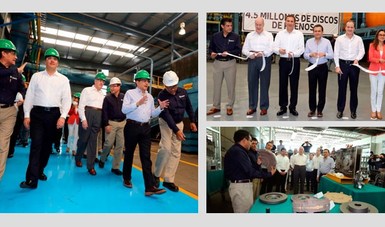With the representation of the President of Mexico, Enrique Peña Nieto, the Secretary of Economy, Ildefonso Guajardo Villarreal, attended today, in San Martín Texmelucan, a ceremony of expansion of the plant owned by the Rassini company, which designs and produces components for suspension and brakes for the automotive industry.
The Governor of Puebla, Rafael Moreno Valle; the Directors of the company, Eugenio Madero and Antonio Madero; the Secretary of Competitiveness, Employment and Economic Development of the state, Cristina González; as well as local authorities and company representatives were present.
According to information of the company, just over $ 25 million were invested to expand the production area; besides, the direct jobs will increase to 500 thousand.
The Secretary of Economy said that, before the entry into force of the North American Free Trade Agreement (NAFTA), Mexico exported four billion dollars in auto parts and today have reached 157 billion dollars.
The growth of the industry said, has placed Mexico in the fifth place, worldwide, in exporting auto parts.
In particular, he referred to the historic moment in the country's investment: since the first of December, when Enrique Peña Nieto assumed the Presidency of the Republic, Mexico has earned 22 thousand 600 million dollars in the terminal and parts industry through investment announcements, the placing of first stones or plant openings.
He commended the high dynamics of development of Puebla with the leadership of Governor Rafael Moreno Valle and the commitment of visionary entrepreneurs like Antonio Madero Bracho, who, as founder, he had to face the first big moment of Rassini. "He built his first auto parts plant in 1988. At that time, I am sure, Antonio could not imagine the possibilities it had to integrate a free trade market in North America."
"For our generation, before 1994, it was unthinkable that three economies with different levels of development could ally in a free trade zone. The truth is that, it was achieved, it was joined, and many Mexican businessmen doubted about that step, because they believed we had not the competitive capabilities to face it," said the Secretary of Economy.
As stated by the Governor, said the Secretary of Economy, more than a hundred of Mexican companies, not only were able to compete to further positioning themselves in the domestic market, as Rassini did, internationally, with highly efficient plants worldwide. And that it is thanks to the quality of the Rassini family team.
Eugenio Madero, Director General of Rassini, stressed that his company has grown in Mexico and in its development, so that "we are investing in an expansion program of more than 40 percent of capacity, which will make us reach 26 percent the North American market in a record time."
He stressed that its customers include world-class automotive companies like General Motors, Ford, Nissan, Volkswagen, Fiat, Chrysler, Audi and Toyota, among others.
He said "this plant and these people is the best there is", while he recalled that in May 2014 he received from the President, Enrique Peña Nieto, the National Export Award. It was a great achievement and, as a sign of confidence in the investors, the stock of the company rose 400 percent in value, being the most advanced of all companies listed on the Mexican Stock Exchange.
The Governor Rafael Moreno Valle recognized the Government of the Republic, and in particular the Secretary of Economy, for his unconditional support to the entrepreneurs from Puebla, "with whom we share the conviction that the best way to bring progress and development is through investments".
The Secretary Ildefonso Guajardo was accompanied by the General Coordinator of Federal Delegations of the Secretariat of Economy, Jorge Cantú Valderrama, and the Delegate in the state, Juan Pablo Jiménez Concha.
Rassini is the largest producer of components for suspensions of light commercial vehicles and of brake discs vertically integrated of the American continent. It has eight manufacturing plants located in the United States, Mexico and Brazil, and four technology centers in these countries.
